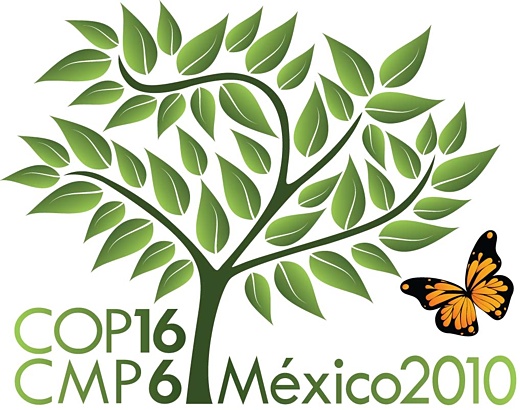 Image above: Logo for the current climate summit meeting in Mexico.
Image above: Logo for the current climate summit meeting in Mexico.
By Richard Levangie on 29 November 2010 for Triple Pundit - (http://www.triplepundit.com/2010/11/clearing-air-cancun-climate-summit/comment-page-1/)
As COP-16 begins in Cancun, Mexico, world leaders need to understand that global warming isn’t only about carbon dioxide. In a world that is stepping close to a steep and dangerous precipice, doing more to reduce non-CO2 climate change contributors such as methane, black carbon soot, tropospheric ozone, and hydrofluorocarbons (HFCs) might help head global warming off at the pass, according to Professors Veerabhadran Ramanathan of the Scripps Institution of Oceanography, and David G. Victor at the University of California, San Diego.
In a commentary in The New York Times, the authors argue that adopting a new perspective could transform the debate at a United Nations climate change conference even though it’s beginning with exceedingly low expectations. Most analysts believe that little of substance will be forthcoming because current negotiating positions among the big players — the U.S., Europe, India and China — are moving further apart.
But climate scientists and policy analysts like Ramanathan and Victor are offering a way to solve the diplomatic impasse.
“The opportunity to make progress arises from the fact that global warming is caused by two separate types of pollution,” write Ramanathan and Victor. “One is the long-term buildup of carbon dioxide, which can remain in the atmosphere for centuries. Diplomacy has understandably focused on this problem because, without deep cuts in carbon dioxide emissions, there can be no permanent solution to warming.
“The carbon dioxide problem is hard to fix, however, because it comes mainly from the burning of fossil fuels, which is so essential to modern life and commerce. It will take decades and trillions of dollars to convert all the world’s fossil-fuel-based energy systems to cleaner systems like nuclear, solar and wind power. In the meantime, a fast-action plan is needed.”
Many climate scientists believe that HFCs, a potent greenhouse gas that was developed to replace ozone-depleting CFCs, are already covered by existing treaties like the Montreal Protocol, and those treaties could be could be leveraged to cut HFC emissions dramatically.
Similarly, black carbon is a huge pollution problem in the developing world — and it has been responsible for about 50 percent of the warming we’ve seen in the Arctic. The good news is it can be reduced sharply and simply by providing relatively inexpensive solar-power stoves and diesel particulate engine filters to people living in the world’s poorest regions. Even better, such a step wouldn’t not only slow global warming; it will also greatly improve the local air quality and health of people living in cities and countries where poverty is rife. More than 1.9 million deaths are attributed to black soot every year.
Methane, a greenhouse gas that is 25 times as potent as CO2, commonly enters the atmosphere as emissions from coal mines, livestock waste, landfills, and rice paddies. By implementing a few simple changes, it’s possible to cut methane emissions by more than 40 percent. It would start with replacing corroded natural gas pipelines, implementing better cultivation techniques for rice, and collecting waste methane from landfills and using it to generate energy, among other things.
None of these individual solutions will stop global warming, but they would buy us a few decades so that we can get our act together. Deploying clean technologies like wind, solar, nuclear, and geothermal will take time, and it will take money.
Since our leaders can’t agree on the big issues, perhaps focusing on smaller steps, with a much quicker payoff, will create the goodwill now that will allow for a comprehensive climate treaty in the future.
We need to get politicians to change their minds because we can’t change the laws of physics.
.
No comments :
Post a Comment